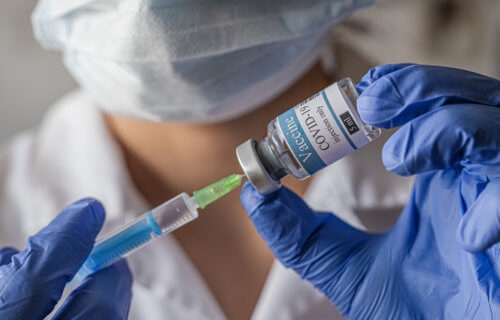RICHMOND, Va. — The coronavirus vaccine is finally a real thing and millions of people have already received it. While the rollout has the world cheering, researchers from Virginia Commonwealth University finds many Americans aren’t exactly chomping at the bit to be the first in line for the vaccine under an emergency use authorization. Their survey reveals 53.1 percent are definitely, likely, or somewhat unwilling to get the shot under emergency use conditions.
The poll does find that 46.9 percent of the 788 U.S. adults surveyed are definitely, likely, or somewhat willing to receive the vaccine under such conditions. So what is keeping the majority of the United States from getting their first shot?
If researchers remove the emergency use authorization stipulation, 59.9 percent of respondents are definitely or probably planning on being vaccinated in the future. Meanwhile, 18.8 percent are neutral on the entire matter and 21.3 percent are probably or definitely not getting the vaccine.
“The biggest issue coming out of this study is that participants seemed worried about receiving the COVID-19 vaccine under emergency use authorization,” says lead author and VCU assistant professor Jeanine Guidry, Ph.D., in a university release.
Fears of side effects from COVID vaccine
So why are Americans shying away from “emergency use” of the COVID vaccine? Concerns over potential side-effects appear to be the top answer to that question.
“Such concerns are not unusual,” Guidry adds, “but we now also know that two of the vaccines — Pfizer and Moderna — may have some expected side effects … and that may make people hesitate to get the vaccine.”
Researchers also discovered a number of differing opinions among people of different age groups and ethnicities. Younger Americans are more willing to get the coronavirus vaccine than older adults. Whites are also more likely to feel good about receiving a COVID shot in comparison to African Americans. Both of these differences stayed steady regardless of the inclusion of the emergency use authorization stipulation.
“That is something researchers have found in other previous vaccine studies as well, but it is more worrying with COVID-19 because we know that Black Americans are infected with COVID-19 significantly more frequently than white Americans, and they are also more likely to die from the virus,” the VCU researcher adds.
“Unfortunately, there is history of medical mistreatment of African Americans and individuals from low-income communities in the U.S.,” notes study co-author Bernard Fuemmeler, Ph.D., a professor in the VCU School of Medicine. “Against this backdrop it is understandable that mistrust among certain communities will be an issue to contend with as we hope to make progress in delivering the vaccine to those most in need,” he continues. “It starts with recognizing this history and providing people with the information they desire to alleviate their justifiable wariness about the vaccine.”
Culture of distrust
Education levels and whether or not respondents had access to health insurance also played a significant role in their responses. Researchers say health officials should use the findings to tailor vaccine messaging so it will put Americans’ concerns to rest. They believe many of the vaccine hang-ups among the American public go far deeper than just concerns surrounding side effects; suggesting that public trust in government agencies and medicine must be restored. While it’s understandable for anyone to want to know what their being injected with, the VCU team says the amount of misinformation and misunderstandings out there about the vaccine is staggering.
“A vaccine is only effective if people are vaccinated, and so it is really crucial that people trust the vaccine, and are willing to get it,” Guidry explains. “We will only reach community-level immunity if about 70% of the population has gotten the vaccine. So knowing what some of the barriers are to getting this vaccine is really important, because we may be able to better communicate and address these concerns.”
“It is a reminder that there are some real fears among the public about the vaccine being developed too quickly,” she concludes. “In reality, while this particular vaccine was developed rather quickly, the science that has allowed for this to occur has been progressing for the past 10 years. I think we need to make sure people better understand the vaccine development process, and what exactly it means when a vaccine becomes available under emergency use authorization.”
The study is published in American Journal of Infection Control.
